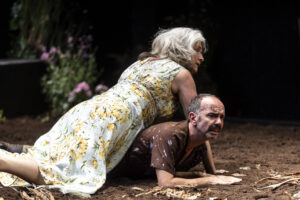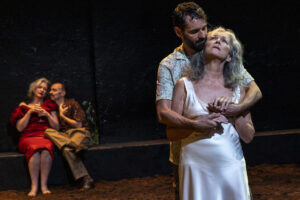Belvoir St Theatre, February 19
7/10
What’s the worst thing you’ve ever done, by yourself or as part of a collective? Can you say it out loud? Does anyone else know? Do you resent them for knowing? Will you ever forget this thing you did? Can you ever forgive yourself? Should you ever forgive yourself?
These are the sorts of questions Andrew Bovell asks in Song of First Desire, here having its first Australian season after premiering in Madrid, where, following successful productions of two of Bovell’s previous plays, it was decided to collaborate on a third. This would investigate Spain’s ongoing struggle to knit itself back together after the horrors of firstly the Civil War and then the Franco years.

Eight Spanish characters across three generations constitute Bovell’s case study, the universality lying in everyone and every nation having a past, with unresolved pasts inevitably resulting in ongoing torment. The play is epic in its transgenerational scope and the profundity of its questions, yet it also shrinks to taut family drama, even down to the poisonous kinship between two twins and a toxic marriage between a fascist lackey and his wife.
Director Neil Armfield returns to Belvoir to continue his fecund partnership with Bovell. His cast contains two actors from the Madrid production, Borja Maestre and Jorge Muriel (the Spanish translator of Bovell’s work), plus Kerry Fox and Sarah Peirse.
The latter, yet again, excels, playing elderly Camelia in the present day and younger Margarita when the play dredges the past. Peirse moulds her characters as if from clay, making shapes and angles that she then imbues with the electricity of words. She communicates so much without speaking that when she does, she grips you with her intensity, whether when she hardens her voice until it has a metallic edge, or when she’s as vulnerable as a pressed flower.

Maestre has presence and conviction in both his roles, Muriel is especially good at exuding the menace of the fascist Carlos, and Fox has Carmen, Carlos’ wilfully ignorant wife, more nailed than Julia, the abrasive twin of Luis (also played by Muriel).
But as the stakes rise to jagged heights more usually found in Greek tragedy, a taint of melodrama stains the production. It feels as though as it reaches for those altitudes it should somehow become more spartan, less wordy. The latter is an odd comment to make about a Bovell play, because the lyrical economy evident just in the (Lorca-derived) title has been such a hallmark of work that’s placed up him among our most distinguished dramatists.
There’s no sense of melodrama in Peirse’s performance, however. Perhaps there could have been more of this stillness in the production as a whole when the drama rears up; perhaps less angst in the writing and less fastidious tying up of familial connections across the generations. Then the sense of menace would be all the greater – and this menace of which Bovell writes is now all around us.
Until March 23.